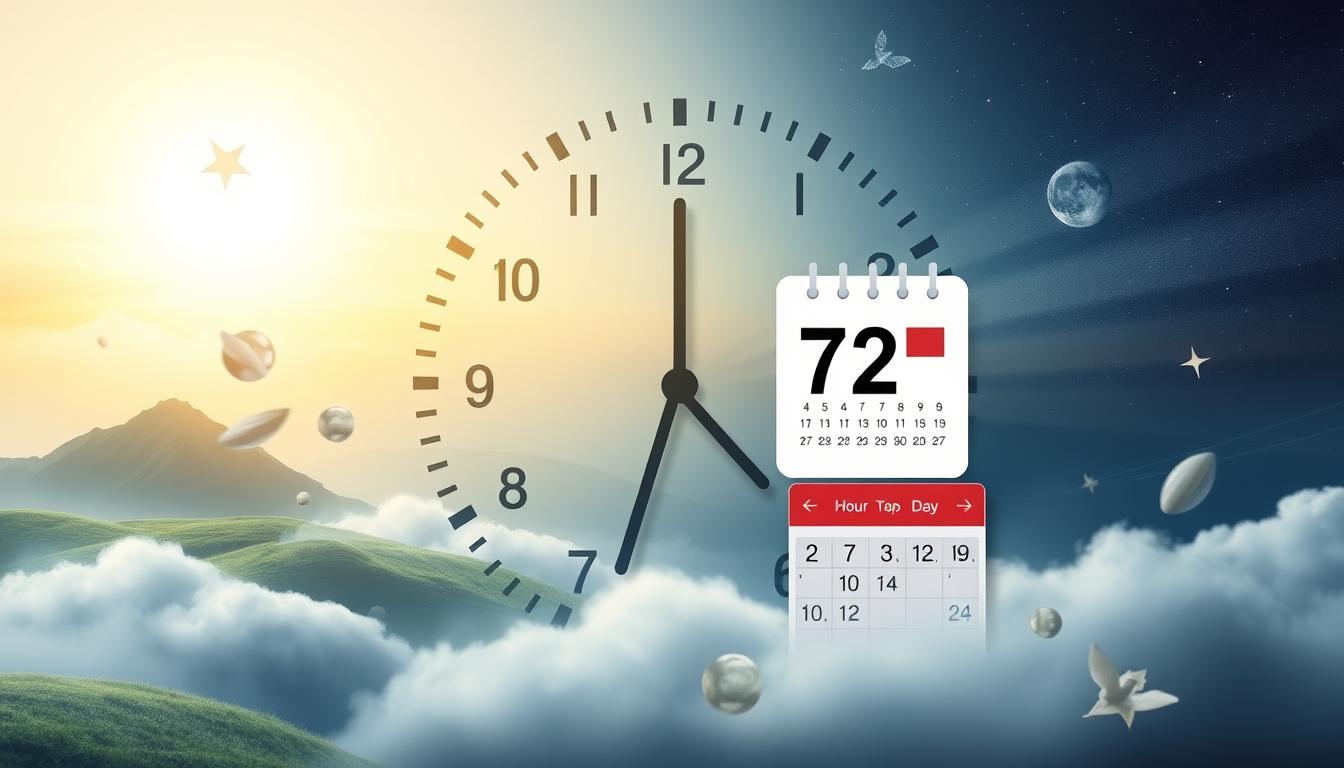Convert 72 Hours to Days: The Answer Revealed
Understanding time measurements is crucial in our daily lives, and one common question that arises is how many days is 72 hours. To answer this, we need to convert 72 hours to days, which is a simple yet essential calculation. Knowing 72 hours in days can help us plan and manage our time more efficiently.
Converting time units is vital in various aspects of life, from scheduling appointments to planning projects. The ability to convert 72 hours to days can make a significant difference in our productivity and organization. In this article, we will delve into the world of time measurements and explore the conversion of 72 hours to days.
Key Takeaways
- Understanding time measurements is essential in daily life
- Converting 72 hours to days is a simple calculation
- Knowing 72 hours in days can help with time management
- Time unit conversion is vital in scheduling and planning
- 72 hours in days can impact productivity and organization
- Accurate time conversion is crucial in various aspects of life
Understanding Time Measurements
Time is a fundamental aspect of our daily lives, helping us organize activities and plan effectively. Grasping the basic units of time is essential for various conversions, such as the hours to days conversion.
What are Hours and Days?
An hour is a unit of time equal to 60 minutes, while a day consists of 24 hours. These measurements are standard across the globe, providing a common framework for scheduling and time management.
- Hour: 60 minutes
- Day: 24 hours
- Week: 7 days
How Do We Define 72 Hours?
Seventy-two hours represent a three-day period. Understanding the hours and days conversion formula is crucial for accurately converting this time frame into days.
| Hours | Days |
|---|---|
| 24 | 1 |
| 48 | 2 |
| 72 | 3 |
The Conversion Process
Converting hours into days calculation is straightforward once you understand the basic method. By knowing how to convert hours to days, you can easily manage and plan your time effectively.
Simple Calculations
To convert hours to days, divide the number of hours by 24, since there are 24 hours in a day. For example, to convert 72 hours to days, you would perform the following calculation:
- 72 hours ÷ 24 = 3 days
This simple calculation helps you quickly determine the equivalent number of days for any given number of hours.
Using Conversion Tools
If you prefer not to do the math manually, several online tools and smartphone apps can assist in converting hours to days. These tools simplify the process and ensure accuracy.
- Google Calculator: Type “72 hours to days” directly into the Google search bar to get an instant conversion.
- UnitConverters.net: Visit this website to use their comprehensive unit conversion tools.
- ConvertPad App: Download this app on your smartphone for on-the-go conversions.
Real-Life Applications
Understanding how 72 hours equals how many days is essential in various aspects of daily life. This conversion clarifies timeframes, aiding in better decision-making and planning.
Examples in Daily Life
Many situations require quick and efficient time management. Here are some common examples:
- Travel Planning: Knowing that a trip lasting 3 days helps in booking flights and accommodations.
- Work Schedules: Employees often work in 3-day shifts to ensure continuous coverage.
- Event Organization: Planning a weekend event involves scheduling activities within a 72-hour period.
Importance in Scheduling
Accurately converting 72 hours equals how many days enhances scheduling efficiency. It allows individuals and organizations to:
- Allocate sufficient time for tasks and activities.
- Avoid overbooking or underutilizing available time.
- Improve overall time management and productivity.

| Application | Benefit |
|---|---|
| Travel Planning | Efficient booking and itinerary creation |
| Work Schedules | Ensures continuous operation and staff management |
| Event Organization | Streamlines activity planning and resource allocation |
Related Time Conversions
Grasping different time conversions complements the functionality of any hours to days calculator. By mastering these conversions, you can enhance your time management skills effectively.
Minutes to Hours
Converting minutes to hours is simple. Divide the number of minutes by 60 to find the equivalent hours. For example, 180 minutes equal 3 hours. This method is essential when using an hours to days calculator for precise scheduling.
Seconds to Minutes
To transform seconds into minutes, divide the total seconds by 60. For instance, 240 seconds make 4 minutes. This conversion is particularly useful for detailed time tracking and planning.
Common Questions
Understanding the duration of 72 hours can be crucial in various situations. Let’s explore some common queries related to this time frame.
How is 72 Hours Used?
The 72-hour period is a standard measure in multiple fields:
- Medical: Patients are often monitored for 72 hours after a procedure to ensure stability.
- Travel: Airlines may require passengers to complete certain actions within 72 hours of booking.
- Business: Companies use 72 hours to set deadlines for project milestones or responses.
Is 72 Hours Always Three Days?
Generally, 72 hours equate to three days. However, this can vary based on the context:
- Start Time: If the countdown begins in the evening, it might span into the fourth day.
- Business Days: Some organizations consider only business days, excluding weekends.
Therefore, while 72 hours in days is typically three, specific scenarios might adjust this understanding.
Clarifying Misconceptions
Many believe that converting hours to days is simple. However, the hours to days conversion can be more complex due to different contexts and factors affecting time measurement.

Can 72 Hours Span Different Contexts?
When you convert hours to days, 72 hours might not always equal exactly three standard days. In situations like travel or event planning, 72 hours can extend over weekends or holidays, altering the expected timeline.
Understanding Time Zones
Time zones greatly impact the hours to days conversion. Crossing multiple time zones can change how 72 hours are perceived. For example, traveling east or west can make the same number of hours feel shorter or longer, depending on the direction and number of zones crossed.
Practical Tips for Time Management
Managing your time effectively over a 72-hour period can significantly enhance productivity and reduce stress. By understanding the hours into days calculation, you can better organize your tasks and achieve your goals.
Planning with 72 Hours in Mind
Start by outlining all the tasks you need to accomplish within the three-day framework. Utilize the hours and days conversion formula to allocate specific time slots for each activity.
- Divide your day into manageable blocks of time.
- Set clear priorities to focus on essential tasks first.
- Allocate buffer time for unexpected delays.
Having a structured plan helps in maintaining clarity and ensures that you stay on track.
Monitoring Projects
Regularly tracking your progress is crucial. Use the hours into days calculation to assess how much time you’ve dedicated to each task.
- Schedule daily check-ins to review your accomplishments.
- Adjust your plans as needed based on your progress.
- Stay flexible to accommodate any changes or challenges.
By consistently monitoring your projects, you can make informed decisions and keep your 72-hour plan effective.
Fun Facts About Time
Time has always intrigued humans, leading to diverse methods of measurement across different eras and cultures. Understanding how we’ve tracked 72 hours equals how many days reveals fascinating insights into our relationship with time.
Historical Timekeeping
Ancient civilizations developed various tools to measure time:
- Sundials: Used shadows to indicate hours during daylight.
- Water Clocks: Measured time by the flow of water.
- Hourglasses: Utilized sand to track 3 days intervals.
The invention of mechanical clocks in the Middle Ages revolutionized timekeeping, allowing for more precise measurements.
Cultural Variations in Time Measurement
Different cultures have unique approaches to time:
- Egyptians: Divided day and night into 12 hours each.
- Maya Civilization: Used a complex calendar system with multiple cycles.
- Indigenous Tribes: Often based time on natural events like seasons and lunar phases.
These diverse methods highlight that understanding 72 hours equals how many days can vary depending on cultural contexts and historical periods.
Conclusion
Understanding how many days is 72 hours plays a crucial role in effective time management. Throughout this article, we’ve explored various facets of time measurement and conversion, providing you with the tools to navigate your daily schedules seamlessly.
Recap of Key Points
We began by defining hours and days, establishing a clear foundation for time conversion. Utilizing simple calculations and hours to days calculators, we demonstrated how to efficiently convert 72 hours into days. Real-life applications highlighted the importance of this conversion in planning events, managing projects, and optimizing personal productivity. Additionally, we addressed common questions and clarified misconceptions to ensure a comprehensive understanding of time measurement.
Encouragement to Utilize Time Wisely
With a solid grasp of how many days is 72 hours, you are better equipped to manage your time effectively. Implementing the strategies discussed can lead to improved scheduling, enhanced project monitoring, and overall increased productivity. Embrace these insights to make informed decisions about your time, ensuring that you maximize every day to achieve your goals and maintain a balanced lifestyle.














Post Comment